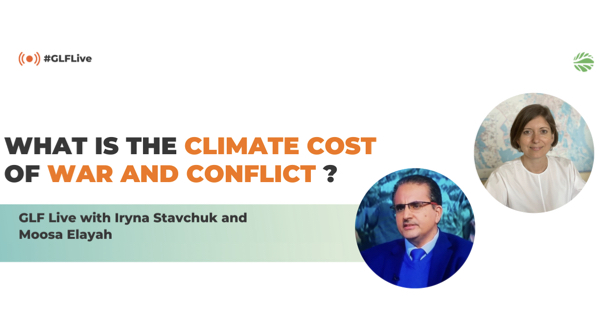Deputy environment minister Iryna Stavchuk and conflict expert Moosa Elayah call for cash aid and inclusion of climate in peacekeeping talks.
(BONN, 14 April 2022) – Against a backdrop of armed conflict rippling through multiple regions of the world, at rates set to rise fivefold if global warming continues, Ukrainian deputy minister of environmental protection and natural resources Iryna Stavchuk and conflict and peacebuilding expert Moosa Elayah of the Doha Institute for Graduate Studies, exchanged on the climate cost of war and conflict. The discussion, hosted by the Global Landscapes Forum, focused on actual and potential environmental consequences of the wars in Ukraine, Yemen and Syria and put forth calls to the international community for more cash aid and inclusion of climate change in peacekeeping discussions.
Deputy Minister Stavchuk expressed severe concern over:
- Potential spread of radioactive pollution throughout Eastern Europe
- Environmental fallout of continued attacks on oil deposits, tanks, factories and infrastructure
- Dangers of landmines to local people, endemic plant and animal species, and agriculture
- Inability for Ukraine to continue its efforts to reduce emissions, having to instead emit more greenhouse gases in rebuilding processes
- Decreased food production, which has already dropped by one-third and typically provides a high proportion of staple foods to developing countries already experiencing conflict
She said, however, that the war can serve as a catalyst for the phase-out of fossil fuels in other countries as well as in Ukraine, which can commit to rebuilding with the use of renewable energy. Her ministry, she said, is continually assessing the environmental impacts of the war with what quantifiable measures they can, though more time is needed for accurate measurements and ensuing requests for aid.
Dr. Elayah spoke on how climate change is driving conflict in the Middle East:
- Recurrent floods, extreme storms and unpredictable weather events displacing large populations in Yemen and spurring continued conflict
- Causing the spread of diseases and health risks
- Mass migration of people from rural agricultural landscapes to urban centers
- Pervasive government mismanagement of vital natural resources and pollution control, degrading the agriculture sector and the provision of basic needs
- Profitable resources such as oil and gas spurring conflict and emissions simultaneously
Dr. Elayah called for the international community to continue projects that happen at the community level in countries where conflict is ongoing, as well as to substitute food aid with cash aid that helps local people fund small-scale adaptation and mitigation efforts.
Watch here the recording of this GLF Live.
###
The Global Landscapes Forum (GLF) is the world’s largest knowledge-led platform on integrated land use, connecting people with a shared vision to create productive, profitable, equitable & resilient landscapes. Learn more at www.globallandscapesforum.org.












